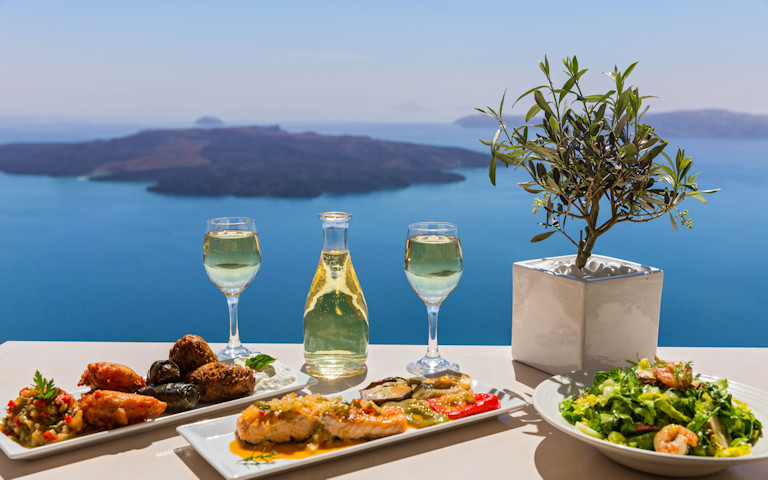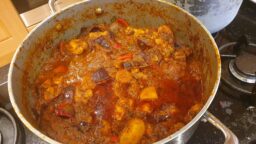Restaurant Curry
Finally a proper restaurant-grade curry made at home
British-Asian Main. Pubblicato di Jon Scaife. Updated .
MED
Energy Density
1.5kcal/g
1.5kcal/g
MED
Fat
85g / serving
85g / serving
MED
Saturates
13g / serving
13g / serving
LOW
Sugars
1.6g / serving
1.6g / serving
MED
Salt
4g / serving
4g / serving
LOW
Fibre
9.7g / serving
9.7g / serving
Suitable for:HalalKetogenicKosherPartyPescetarianPregnancyVeganVegetarian
I have been searching and experimenting on and off for around 15 years to try to achieve home made curry with the same richness and depth of flavour as those found in a quality authentic Indian, Pakistani or Bangladeshi restaurant. Finally I succeeded. Several different parts must be made but all of them can be pre-made and will keep for weeks or months.
Preparation
Pre-prep
- This recipe requires a number of pre-made components which take some time to make so the first time you make it expect to spend quite a few hours.
- I recommend making the curry-onion base sauce first, and then whilst it is cooking make the garlic-ginger paste and then the spice mixes
- There are 4 spice mixes needed - Garam Masala, Panch Phoran, Curry Powder, and Restaurant mix. Make the Garam Masala and Curry Powder first as they go into the Restaurant Mix
Chicken Curry final stage
- The ingredients for this stage are listed for a portion for a single person. You will need to multiply accordingly!
- If serving with rice this is a good time to boil a pan of water for the rice (assuming you're boiling it)
- Cut the chicken into edible size chunks - around 2.5cm per edge
- Pre-cook the chicken in salted water or stock. Make sure it is completely covered by the liquid. This will take around 15 mins.
- Leave to cool a little
- Mix the
tomato purée and water well - This is a good time to put rice into the boiling water if you are making boiled rice
- In a large pan heat the oil. Do not skimp on the oil. Many recipes insist on a neutral oil but I found extra virgin olive oil worked very well
- When the oil is hot and shimmering turn the heat down a touch to a medium setting and add the whole spices (the panch poran and the brown mustard seeds) and stir briefly. They spices should be completely covered by oil. After around 15 seconds bubbles should form.
- Add the garlic-ginger paste - which will spit
- Stir in well and cook until it stops spluttering - around 30 seconds
- Now add the powdered spices and stir in well. After 10 seconds or so lift the pan off the heat to ensure the spices don't burn - you don't want them to go significantly darker
- Mix the
tomato purée and water to make atomato paste - Put the tomato-water paste in, put the pan back on the heat and turn up the temp. Stir well and cook for another 30 seconds or so. Bubbles should start to form
- Add around ⅕ of the curry-onion base sauce and stir in for 30 secs
- Add another ⅖ and stir in and cook for 1-2 mins
- Add the final ⅖, stir, and cook for another minute or so
- Reduce the heat to a low-medium
- Add the pre-cooked chicken and cook for 5+ mins
- You can keep the curry on a low simmer until your rice is cooked
Notes
- Where precise quantites are needed measurements are given in grams.
- The recipe can easily be made vegan by replacing the chicken
- Full credit for the inspiration and inside tipe goes to the website Glebe Kitchen. What a legend!
- To make a Madras add 1tsp lemon juice and 1/2tsp cayenne pepper per portion
- To make a Jalfrezi: add 1/2 red pepper, 1/2 onion, 4 cherry tomatoes (halved), 1tbsp fresh corriander, and 2 sliced hot chillis. Chop and fry the onion and pepper at the start. The pepper should blister and go a little blackened which is when to start the main process with the spices. Add the chillis at the same time as the meat. Add the tomatoes 5 minutes before serving. Add the fresh coriander at the end.
Ingredients
- 1tsp panch phoran
- ½tsp brown mustard seeds
- 1tsp kashmiri chilli powder
- 2tsp restaurant mix
- Pinch cinnamon powder
- ½tsp salt
- 4tbsp oil
- 1tbsp garlic-ginger paste
- 1.5tbsp
tomato purée - 3tbsp water
- 350ml curry-onion base sauce
- 200-250g chicken breast
- 2tsp Garam Masala
Equipment
- 2 large pans
- Knife
- Chopping board
- Spice grinder or pestle and mortar
- Weighing scales
- tsp and tbsp measuring implement
Nutritional Facts
- Serving size: 706.7g
- (44% / 55%) Calories: 1091kcal
- (155%)Total fat: 85g
- (65%) Saturated fat: 13g
- (181%) Unsaturated fat: 63.5g
- Mono: 54g
- Poly: 9.5g
- (55%) Cholesterol: 164mg
- Trans Fat: 0g
- (9%)Total carbohydrates: 28g
- Starch: 0g
- (5%) Sugars: 1.6g
- Sucrose: 2.1g
- Glucose: 3.2g
- Maltose: 0g
- Lactose: 0g
- Fructose: 3.2g
- Galactose: 0g
- (39%) Fibre: 9.7g
- (112%)Protein: 56g
- Salts
- (79%) Sodium: 1.6g
- (41%) Potassium: 1.4g
- Minerals
- Calcium: 21%
- Iron: 88%
- Zinc: 22%
- Magnesium: 41%
- Phosphorus: 88%
- Copper: 11%
- Manganese: 17%
- Selenium: 620%
- Fluoride: 1%
- Cryptoxanthin: 0.1g
- Lycopene: 7%
- Lutein: 83mg
- Vitamins
- Vitamin A: 76µg
- Thiamin (B1): 17%
- Riboflavin (B2): 33%
- Niacin (B3): 147%
- Vitamin B5: 68%
- Vitamin B6: 146%
- Folate (B9): 7%
- Vitamin B12: 21%
- Choline: 39%
- Vitamin C: 28%
- Vitamin D: 0%
- Vitamin E: 113%
- Vitamin K: 32%
- Arginine: 3.5g
- Aspartic Acid: 5g
- Glutamate: 7.9g
- Glycine: 2.3g
- Proline: 1.7g
- Serine: 2g
- Tyrosine: 1.9g
- Alanine: 3g
- Cystine: 0.6g
- Amino Acids
- Histidine: 1.9g
- Isoleucine: 2.5g
- Leucine: 4.3g
- Methionine: 1.3g
- Phenylalanine: 2.1g
- Threonine: 2.3g
- Tryptophan: 0.7g
- Valine: 2.7g
- Lysine: 4.9g
- Betaine: 16mg


“It's a beef extract - https://en.wikipedia.org/wiki/Bovril Apparently, due to US FDA rules it can't be imported into the US. You…”